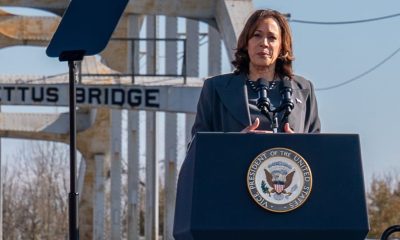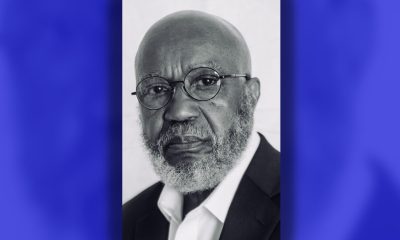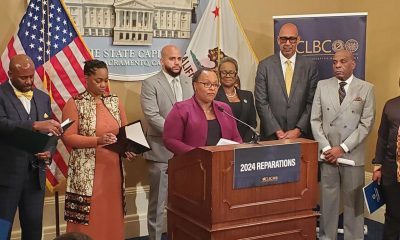Politics
Maine Has Nation’s Top Democracy; Alabama Ranks Last
By Freddie Allen
Senior Washington Correspondent
WASHINGTON (NNPA) – Lawmakers in South Carolina voted last week to remove the Confederate battle flag from the Statehouse grounds, but when it comes to access to democracy, the state still ranks among the worst in the country, according to a recent report by the Center for American Progress Action Fund.
The report by the fund, a sister group of the Center for American Progress, ranked all 50 states and the District of Columbia on 22 different factors that contribute to the overall health of state-level democracy and divided them into three categories: accessibility to the ballot box, representation in state government, and influence in the political system.
South Carolina received an ‘F’ letter grade for accessibility of the ballot, a ‘D+’ for diversity in representation in state government and an ‘F’ for laws that control influence in the political system.
But South Carolina was not the worst – that distinction belongs to Alabama (26.6 percent Black population).
The state with the healthiest democracy is Maine (1.4 percent Black population). North Carolina, Pennsylvania, New York, South Carolina, Mississippi, Indiana, Kentucky, Tennessee, Virginia joined Alabama at the bottom of the list ranking as the worst states when it comes to access to democracy.
Michele Jawando, the vice president of legal progress at the Center for American Progress Action Fund, said that access to the freedoms guaranteed under the Constitution is too often decided by where you live.
“Whether it is access to voting rights, representation in government, or the outsized influence of money in our political system, the opportunity to interact with and participate in democracy is available to some, but blocked for many,” said Jawando. “There are, however, many factors that make up a healthy democracy that should be evaluated in sum, not in silos, if solutions are going to have an overall effect.”
Those factors include availability of pre-registration, in-person early voting, online voter registration, diversity in representation, felony disenfranchisement laws and campaign contribution limits for individual donors.
“In one state, a citizen may have elected officials who are nearly representative of the state’s demographic makeup; in another, some groups may be woefully underrepresented,” the report explained. “One citizen may live in a state where elected officials are beholden to big money, while in the state next door, policymakers could be trying to counteract its influence.”
States that were forced to preclear any changes to their voting laws with the Justice Department prior to the United States Supreme Court decision in Shelby v. Holder which gutted the Voting Rights Act of 1965 also ranked near the bottom in access to the ballot box.
“While several of these states may perform well in other categories, each of the nine states that were covered in total by preclearance requirements performs poorly in accessibility of the ballot: They are ranked in the bottom half of all states in that section, and none gets a grade higher than a D+,” the report said.
In six of the nine states (Alabama, Georgia, Louisiana, Mississippi, South Carolina and Virginia) that were covered by the preclearance formula in Section 4 of the Voting Rights Act, Blacks account for a higher percentage of the population than the national average and are disproportionately affected by laws that block access to the voting booth.
“While several states, including California, Massachusetts, and Louisiana, have taken steps to expand pre-registration, North Carolina eliminated its pre-registration program as part of a package of voter restrictions in advance of the 2014 election, stated the report. “Currently, 14 states and the District of Columbia offer preregistration to 16- and 17-year-olds, while 36 states do not.”
The United States Supreme Court decision in Citizens United v. Federal Election Commission not only made it easier for groups that chose to support a given candidate campaigns to amass huge amounts of cash, the decision also made it harder for states to control the influence of money on the political landscape.
Nebraska had the weakest laws affecting public influence in the political system and Connecticut ranked first. Alabama, Indiana, Missouri, North Dakota, Ohio, South Carolina, Pennsylvania and Wisconsin received an “F” grade for weak policies affecting influence in the political system.
The report recommended that states pass measures making it harder for “lawmakers-turned-lobbyists” to cash in on their time in public office, online voter registration, same day voter registration and expanding early voting options.
“Nationwide, there has been a concerted attack on in-person early voting hours – with a particular focus on evening and weekend hours, the hours most likely to be used by people of color and by voters who do not have the luxury of leaving work to vote during daytime hour,” said the report.
States should also eliminate voter ID laws and pass legislation to restore voting rights to ex-offenders.
“According to The Sentencing Project, ‘denying the right to vote of an entire class of citizens is deeply problematic to a democratic society and counterproductive to effective reentry,’” stated the report. “States should provide either automatic restoration of voting rights or a transparent, affordable, well-publicized process to restore ex-offender voting rights after prison sentences have been served.”
The report concluded that every state had room for improvement, given their relative strengths and weaknesses related to access to the ballot, representation in government, and the political influence wielded by a few wealthy donors compared to the will of the majority.
“The suite of issues that make up an effective democracy are both diverse and inextricably interconnected,” said Lauren Harmon, the voting campaign director at the Center for American Progress Action Fund. “Solutions range from incremental to sweeping, but none is too small to help improve what is a broken system in many states.”
Harmon continued: “We have to ensure that all Americans have full access to their democracy by enacting policies that encourage fairness and engagement.”
Activism
Oakland Post: Week of April 24 – 30, 2024
The printed Weekly Edition of the Oakland Post: Week of April 24 – 30, 2024

To enlarge your view of this issue, use the slider, magnifying glass icon or full page icon in the lower right corner of the browser window. ![]()
Bay Area
MAYOR BREED ANNOUNCES $53 MILLION FEDERAL GRANT FOR SAN FRANCISCO’S HOMELESS PROGRAMS
San Francisco, CA – Mayor London N. Breed today announced that the U.S. Department of Housing and Urban Development (HUD) has awarded the city a $53.7 million grant to support efforts to renew and expand critical services and housing for people experiencing homelessness in San Francisco.

FOR IMMEDIATE RELEASE:
Wednesday, January 31, 2024
Contact: Mayor’s Office of Communications, mayorspressoffice@sfgov.org
***PRESS RELEASE***
MAYOR BREED ANNOUNCES $53 MILLION FEDERAL GRANT FOR SAN FRANCISCO’S HOMELESS PROGRAMS
HUD’s Continuum of Care grant will support the City’s range of critical services and programs, including permanent supportive housing, rapid re-housing, and improved access to housing for survivors of domestic violence
San Francisco, CA – Mayor London N. Breed today announced that the U.S. Department of Housing and Urban Development (HUD) has awarded the city a $53.7 million grant to support efforts to renew and expand critical services and housing for people experiencing homelessness in San Francisco.
HUD’s Continuum of Care (CoC) program is designed to support local programs with the goal of ending homelessness for individuals, families, and Transitional Age Youth.
This funding supports the city’s ongoing efforts that have helped more than 15,000 people exit homelessness since 2018 through City programs including direct housing placements and relocation assistance. During that time San Francisco has also increased housing slots by 50%. San Francisco has the most permanent supportive housing of any county in the Bay Area, and the second most slots per capita than any city in the country.
“In San Francisco, we have worked aggressively to increase housing, shelter, and services for people experiencing homelessness, and we are building on these efforts every day,” said Mayor London Breed. “Every day our encampment outreach workers are going out to bring people indoors and our City workers are connecting people to housing and shelter. This support from the federal government is critical and will allow us to serve people in need and address encampments in our neighborhoods.”
The funding towards supporting the renewal projects in San Francisco include financial support for a mix of permanent supportive housing, rapid re-housing, and transitional housing projects. In addition, the CoC award will support Coordinated Entry projects to centralize the City’s various efforts to address homelessness. This includes $2.1 million in funding for the Coordinated Entry system to improve access to housing for youth and survivors of domestic violence.
“This is a good day for San Francisco,” said Shireen McSpadden, executive director of the Department of Homelessness and Supportive Housing. “HUD’s Continuum of Care funding provides vital resources to a diversity of programs and projects that have helped people to stabilize in our community. This funding is a testament to our work and the work of our nonprofit partners.”
The 2024 Continuum of Care Renewal Awards Include:
- $42.2 million for 29 renewal PSH projects that serve chronically homeless, veterans, and youth
- $318,000 for one new PSH project, which will provide 98 affordable homes for low-income seniors in the Richmond District
- $445,00 for one Transitional Housing (TH) project serving youth
- $6.4 million dedicated to four Rapid Rehousing (RRH) projects that serve families, youth, and survivors of domestic violence
- $750,00 for two Homeless Management Information System (HMIS) projects
- $2.1 million for three Coordinated Entry projects that serve families, youth, chronically homeless, and survivors of domestic violence
In addition, the 2023 CoC Planning Grant, now increased to $1,500,000 from $1,250,000, was also approved. Planning grants are submitted non-competitively and may be used to carry out the duties of operating a CoC, such as system evaluation and planning, monitoring, project and system performance improvement, providing trainings, partner collaborations, and conducting the PIT Count.
“We are very appreciative of HUD’s support in fulfilling our funding request for these critically important projects for San Francisco that help so many people trying to exit homelessness,” said Del Seymour, co-chair of the Local Homeless Coordinating Board. “This funding will make a real difference to people seeking services and support in their journey out of homelessness.”
In comparison to last year’s competition, this represents a $770,000 increase in funding, due to a new PSH project that was funded, an increase in some unit type Fair Market Rents (FMRs) and the larger CoC Planning Grant. In a year where more projects had to compete nationally against other communities, this represents a significant increase.
Nationally, HUD awarded nearly $3.16 billion for over 7,000 local homeless housing and service programs including new projects and renewals across the United States.
Activism
Oakland Post: Week of April 17 – 23, 2024
The printed Weekly Edition of the Oakland Post: Week of April 17 – 23, 2024

To enlarge your view of this issue, use the slider, magnifying glass icon or full page icon in the lower right corner of the browser window. ![]()
-

 Activism4 weeks ago
Activism4 weeks agoOakland Post: Week of March 27 – April 2, 2024
-

 #NNPA BlackPress4 weeks ago
#NNPA BlackPress4 weeks agoCOMMENTARY: D.C. Crime Bill Fails to Address Root Causes of Violence and Incarceration
-

 #NNPA BlackPress4 weeks ago
#NNPA BlackPress4 weeks agoMayor, City Council President React to May 31 Closing of Birmingham-Southern College
-

 #NNPA BlackPress4 weeks ago
#NNPA BlackPress4 weeks agoBeloved Actor and Activist Louis Cameron Gossett Jr. Dies at 87
-

 Community1 week ago
Community1 week agoFinancial Assistance Bill for Descendants of Enslaved Persons to Help Them Purchase, Own, or Maintain a Home
-

 Activism3 weeks ago
Activism3 weeks agoOakland Post: Week of April 3 – 6, 2024
-

 Business1 week ago
Business1 week agoV.P. Kamala Harris: Americans With Criminal Records Will Soon Be Eligible for SBA Loans
-

 Activism2 weeks ago
Activism2 weeks agoOakland Post: Week of April 10 – 16, 2024
























































